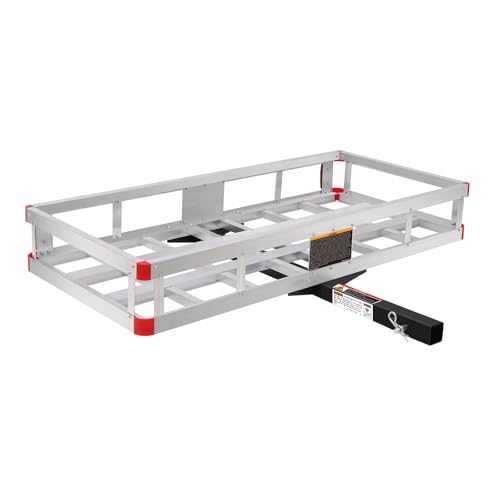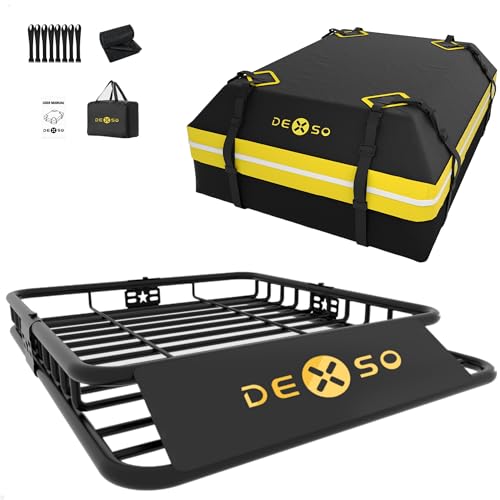Anyone who’s ever needed to transport something bulky, heavy, or just too large for their vehicle’s trunk or interior knows the struggle. Whether it’s gear for a camping trip, furniture, lawn equipment, or a vital mobility aid like a scooter or wheelchair, finding a safe and convenient way to move it can be a real headache. Trying to cram things inside risks damaging your vehicle’s interior or blocking your view, while heavy lifting can put a strain on your back. If you frequently need to transport such items, not having a reliable solution means constant frustration, potential physical strain, or simply being unable to take the things you need with you. I faced similar issues myself, often wishing I had a better way to handle these hauling tasks.
- Universal Hitch Compatibility: Designed to fit all 2" x 2" Class III and IV hitch receivers, this cargo carrier offers versatile compatibility with a variety of vehicles.
- Optimal Dimensions: With outer dimensions of 50" x 29-1/2" x 8-3/4" and inner dimensions of 49" x 27-3/4" x 7-1/2", this cargo carrier provides ample space to transport your belongings securely.
- Impressive Weight Capacity: With a maximum distributed weight capacity of 500 lbs, this cargo carrier allows you to transport a range of items or loads.
What to Look For in a Hitch Mount Carrier
When you realize you need more cargo space than your vehicle can offer internally, or you need a way to transport items that are simply too awkward or heavy to lift, a hitch mount carrier becomes an appealing option. These carriers attach to your vehicle’s receiver hitch, effectively extending your usable cargo area outside the vehicle. They’re a great solution for freeing up interior space, keeping muddy or dirty items outside, or making it easier to load wheeled items like mobility scooters, lawnmowers, or dollies thanks to an integrated ramp.
The ideal customer for a hitch mount carrier is someone who has a vehicle equipped with a 2″ receiver hitch (typically Class III or IV for larger carriers) and needs a way to transport items that exceed their vehicle’s internal capacity or are difficult to load manually. This could be travelers needing extra luggage space, homeowners transporting yard equipment, hunters carrying gear, or individuals needing to transport mobility devices.
Who shouldn’t buy one? If your vehicle doesn’t have a compatible hitch, or if the items you need to carry consistently exceed the carrier’s maximum weight capacity, this isn’t the right solution for you. Someone needing to carry extremely large items might need a full trailer instead. Also, consider that hitch carriers extend behind your vehicle, potentially blocking access to your trunk or tailgate (especially when loaded or folded up) and increasing the overall length of your vehicle, which affects parking and maneuvering. If accessing your trunk is a constant priority and you don’t need the ramp feature, a rooftop carrier or simply a smaller hitch basket might be better, or you might need to explore carriers designed with a swing-away function.
Before committing to a hitch mount carrier, it’s crucial to think about a few key things:
* Vehicle Hitch Compatibility and Capacity: Does your vehicle have the correct hitch receiver size (usually 1.25″ or 2″) and is its tongue weight capacity sufficient to handle the carrier’s weight plus the load you plan to carry?
* Required Weight Capacity: How heavy are the items you typically need to transport? Choose a carrier rated for at least that amount, preferably with some buffer.
* Carrier Dimensions: Are the outer dimensions compatible with your vehicle’s width, and are the inner dimensions large enough for your specific items? How far does it extend from your bumper?
* Loading Needs: Do you need a ramp for wheeled items? If so, consider the ramp length and width, and how it attaches/stores.
* Material: Steel carriers are generally cheaper but heavier and prone to rust. Aluminum carriers are lighter and rust-proof but often cost more.
* Storage: Where will you store the carrier when it’s not on your vehicle? Some fold up, but they still take up space.
* Features: Does it include useful additions like a hitch tightener (to reduce wobble), tie-down points, or reflectors?
- Robust Aluminum Construction: Crafted from extruded aluminum, this basket-style cargo carrier offers a blend of durability, lightweight design, and resistance to rust. Easy to install, clean, and...
- HEAVY DUTY STEEL CONSTRUCTION: 1 Piece construction with matt black powder coating finish that resists the elements, rust and scratches.
- 【LARGE STORAGE CAPACITY】Free up space in your vehicle with this roof rack cargo basket that can hold up to 200 Lbs. Overall dimensions include: 51"(L) x 36"(W) x 5"(H). Additionally, the car roof...
Introducing the MaxxHaul 50945 Carrier
Having wrestled with hauling issues myself, I eventually landed on the idea of a hitch-mounted solution, specifically one with a ramp. That’s how I discovered the MaxxHaul 50945 50 inch x 29.5 inch Trailer Hitch Mount Aluminum Mobility Carrier. This carrier is designed to provide a sturdy, accessible platform for transporting various items, promising a 500 lb capacity and compatibility with common 2″ hitches. It stands out from many basic cargo baskets by including a dedicated ramp, making it particularly appealing for those needing to roll items on and off rather than lifting everything.
When you purchase the MaxxHaul 50945 mobility carrier, you get the main carrier platform (with the folding ramp attached) and a hitch tightener. Compared to simpler steel cargo carriers, the use of aluminum for the platform makes a significant difference in weight and rust resistance, a key advantage. The integrated, relatively long 47-inch ramp is another differentiator, especially for mobility applications, which often feature shorter, steeper ramps. This specific model positions itself as a value-oriented option in the aluminum carrier market, aiming to offer key features typically found on more expensive units. It’s primarily designed for folks who need that ramp capability and appreciate the benefits of aluminum over steel. It might not be the best fit if you need a carrier solely for lighter loads and don’t need a ramp, or if you demand absolute perfect manufacturing tolerances right out of the box.
Here’s a quick look at the pros and cons based on my experience and what others have noted:
Pros:
* Lightweight aluminum construction makes handling and mounting easier than equivalent steel carriers.
* Includes a useful 47-inch folding ramp for easy loading of wheeled items.
* Comes with a hitch tightener to reduce wobble.
* Generous platform size (49″ x 27.75″ usable space) accommodates many items.
* Aluminum platform is rust-proof and easy to clean.
* Integrated reflectors enhance road safety.
Cons:
* Potential for damage during shipping due to packaging.
* Assembly can sometimes involve misaligned holes or slightly bent components requiring minor modification.
* The ramp angle and design may not be ideal for all mobility devices, potentially causing issues with anti-tip wheels or tire grip.
* While rated for 500 lbs, it might feel less stable with loads approaching that maximum, particularly on uneven surfaces.
* U-bolt hitch attachment, while common, might require specific metric tools for assembly.
A Closer Look at Performance and Practicality
After using the MaxxHaul 50945 for a decent period, I can share more detail on how its features translate into real-world performance. The overall experience has been positive, albeit with a few points worth noting, echoing some of the feedback you see from other users.
Universal Hitch Compatibility
One of the big selling points of the MaxxHaul 50945 carrier is its design to fit all standard 2″ x 2″ Class III and IV hitch receivers. This makes it compatible with a wide range of vehicles – RVs, trucks, SUVs, vans, and even some cars, provided they have the correct hitch installed. This versatility is great; you’re not locked into a specific vehicle type. The carrier attaches via a U-bolt system. Assembly involves securing the carrier frame to the hitch receiver tube using this U-bolt and associated plates/nuts. While straightforward in concept, as others have mentioned, sometimes the alignment of the holes for the hitch pin or U-bolt can be slightly off, requiring a bit of jiggling or, in some cases, minor modification to get everything to line up perfectly. Having a set of metric tools handy during assembly is definitely recommended, as the included hardware uses metric sizes.
Size and Capacity
The platform dimensions are ample for many uses. The outer dimensions are 50″ x 29-1/2″, with usable inner dimensions of about 49″ x 27-3/4″. This provides enough space for many standard mobility scooters, large coolers, multiple storage bins, or bulky equipment like pressure washers or generators. The stated weight capacity is 500 lbs, distributed evenly across the platform. For lighter loads, like a couple of large suitcases or camping gear, the carrier feels perfectly stable and secure. However, when pushing towards the upper limit of the 500 lb capacity, say with a heavy mobility chair or a large piece of machinery, you might notice a bit more flex or movement than you’d ideally want, especially when driving over bumps or uneven terrain. It’s rated for 500 lbs, and technically supports it, but personally, for peace of mind, I feel more comfortable keeping loads a bit under that maximum, perhaps closer to 300-400 lbs, particularly if traveling long distances or on rough roads. Always double-check your vehicle’s tongue weight capacity as well; the carrier plus its load cannot exceed that.
Durable Aluminum Construction (and Steel Frame)
A major reason I opted for an aluminum carrier like the MaxxHaul 50945 over a steel one was the material. The platform itself is primarily crafted from lightweight, rust-proof aluminum. This makes the carrier significantly easier to handle when installing or removing it from your vehicle compared to a heavy steel unit. At around 48 lbs, I find I can manage it myself, though it’s definitely easier with a helper or if you have a carrier cart specifically designed for moving hitch carriers (as some ingenious users have fabricated). The aluminum also means you don’t have to worry about rust, which is a huge plus if you live in a wet climate or use it in salty conditions. Cleaning off dirt or mud is also very easy. While the platform is aluminum, the under-support frame is made from heavy-duty powder-coated steel, providing the necessary structural integrity to support the load capacity. This combination of materials balances weight savings with strength. The aluminum platform features multiple anchor points, which are really helpful for securing your load using tie-down straps or bungee cords, ensuring everything stays in place during transit. It also includes reflectors on the outer edges, which increases visibility to other drivers, enhancing road safety, especially at night.
It’s worth mentioning an observation I’ve seen echoed by other users, concerning the design of the platform slats. On some units, the slats aren’t solid, continuous pieces running the full width, but rather shorter sections riveted between the support beams. While these slats are thicker, relying on rivets and thin aluminum connections in this manner raises potential long-term durability questions compared to a fully welded or continuous slat design, especially if the carrier is frequently subjected to heavy, concentrated loads or significant vibration. My unit has held up, but it’s something to be aware of regarding the construction style.
The Integrated Ramp
The star feature for many considering this specific model is the integrated 47-inch folding ramp. This ramp is crucial for loading items that are too heavy to lift but can be rolled, such as mobility scooters, wheelchairs, dollies with gear, or generators. The ramp folds up securely against the carrier platform when not in use. A 47-inch ramp offers a relatively gentle slope compared to shorter ramps, making it easier to push or power items up onto the carrier.
However, the ramp is also where some specific challenges arise, particularly for mobility devices. As some users have pointed out, the angle where the ramp meets the carrier platform isn’t always perfectly flush or at an ideal angle for all mobility scooters. The anti-tip wheels on some scooters can hit the edge of the carrier floor before the drive wheels have fully engaged with the ramp, preventing the scooter from rolling straight up smoothly or causing the drive wheels to spin in place. This might necessitate tilting the scooter or manually assisting it over that initial hump, which defeats some of the purpose of having a ramp for easy loading, especially for users with limited strength. Adding a small piece of wood or a shim at the transition point can sometimes help mitigate this.
Another minor but notable issue with the ramp is the surface grip and reflection. The bare aluminum, while rust-proof, can be a bit slippery, especially if wet. For certain types of tires, like the all-terrain wheels on some mobility devices or lawn equipment, this can lead to wheels spinning rather than gripping the ramp, requiring extra effort to push the item up. Applying some non-skid tape to the ramp surface significantly improves traction. Also, the polished aluminum ramp can be quite reflective in direct sunlight, potentially causing glare that might be distracting. Non-skid tape also helps diffuse this reflection. Despite these quirks, the convenience of having a ramp readily available whenever you need it, that simply folds away, is a huge benefit compared to having to carry or store a separate ramp.
Included Hitch Tightener
Hitch-mounted carriers, especially those using a standard pin and hole connection, can sometimes wobble or rattle in the receiver hitch. This movement can be annoying and can even feel unstable. The MaxxHaul 50945 helpfully includes a hitch tightener designed to minimize this play. A hitch tightener works by using a clamp or bolt system to push the carrier’s hitch tube snugly against the inner walls of the receiver, reducing movement. While the included tightener is a welcome addition, echoing the assembly remarks, some users have reported that the bolt holes for the tightener unit might not align perfectly with their specific hitch receiver tube, rendering it less effective or requiring minor adjustments to get it seated correctly. When installed and tightened properly, however, it does a decent job of stabilizing the carrier and reducing wobble.
What Other Owners Are Saying
Looking around online, it’s clear that my experiences with the MaxxHaul 50945 Aluminum Mobility Carrier resonate with many other users. A common theme is the appreciation for the lightweight aluminum construction and the included folding ramp, which are highlighted as major positives, especially when compared to heavier steel alternatives. Many owners successfully use the carrier for mobility scooters, pressure washers, and other bulky items, finding it a practical solution for expanding their hauling capabilities.
However, the feedback also frequently mentions potential issues right out of the box, particularly related to packaging and quality control. Reports of receiving the carrier with minor dents, bent frames, or misaligned bolt holes seem relatively common, often requiring users to bend parts back into shape or even redrill holes to complete assembly. The challenges with loading certain mobility scooters due to ramp angle or tire grip are also noted by multiple users, leading some to add non-skid tape or make minor modifications to the ramp connection point. Despite these initial hurdles or necessary tweaks, the overall sentiment from many reviewers is that the carrier is a good value for the price, performing its intended job effectively once assembled, even if that assembly process wasn’t perfectly smooth for everyone. The fact that it includes a ramp and is made of aluminum at this price point is a significant draw for many buyers.
Is the MaxxHaul 50945 Right for You?
If you’re tired of struggling to transport bulky items or mobility aids, and you have a vehicle equipped with a compatible 2″ hitch, a MaxxHaul 50945 could be a game-changer. Not having a dedicated solution means limiting your ability to travel with essential items, risking injury from lifting, and potentially damaging your vehicle’s interior. This carrier offers a practical way to solve that problem.
Why consider the MaxxHaul 50945? Firstly, its lightweight aluminum construction makes installation and handling much more manageable than heavier steel carriers. Secondly, the integrated 47-inch folding ramp is a huge benefit for anyone needing to load wheeled items, offering a more accessible slope than shorter ramps. Finally, the inclusion of a hitch tightener is a thoughtful addition aimed at improving stability during transport. While there can be some minor frustrations during assembly or with specific loading scenarios (particularly with certain mobility devices), the overall value proposition for a ramped aluminum carrier is strong.
If this sounds like the solution you need, you can learn more and check it out. Click here to check the product out.
Last update on 2025-10-28 / Affiliate links / Images from Amazon Product Advertising API




